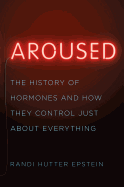
When asked to explain the rambunctious behavior of teens and pre-teens, adults often roll their eyes and say: "hormones." However, it was not until neurosurgeon Harvey Cushing explored the pituitary gland and founded the science of endocrinology in the early 1900s that medicine began to understand the role of human gland secretions and coined the word hormone (from the Greek hormao, meaning to arouse). This and other fascinating details of the history of endocrinology can be found in Randi Hutter Epstein's funny, informative and accessible Aroused (after her similarly entertaining discussion of the nuts and bolts of childbirth in Get Me Out).
With medical and journalism degrees and as Writer-in-Residence at Yale Medical School, Epstein brings a savvy background to a book rich in clever digressions as well as scientific know-how and historical fact. She began her research thinking "hormones were boobs and periods and sex," but quickly realized that they really "control growth, metabolism, behavior, sleep, lactation, stress, mood swings, sleep-wake cycles, the immune system, mating, fighting, fleeing, puberty, parenting and sex"--most everything that makes us human.
What Mary Roach did for the alimentary canal in Gulp and Hope Jahren did for botany in Lab Girl, Epstein does in spades for our glandular network: the pancreas, adrenals, thyroid, ovaries, testes and pituitary. As she summarizes: "They aim to get us back to normal when things are out of whack. And they can be the cause of commotion, too." Maybe the adults are right about flaky teen behavior after all: hormones. --Bruce Jacobs, founding partner, Watermark Books & Cafe, Wichita, Kan.

